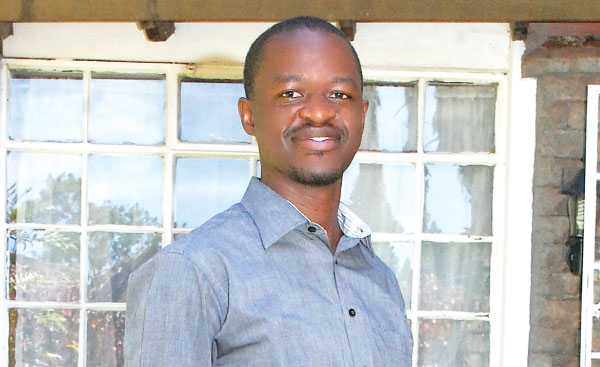KEN OLOO Scripting the future OF SLUM CHILDREN

Ken Oloo is a man obsessed with telling the African story straight from the slums and with a positive twist. Since 2008, his organisation, Filamu Juani, has been working with slum children to equip them with film making skills while helping to pay for their education, all in a bid to uplift the dignity of slum households, one child at a time. The 2013 Acumen Fellow speaks to ESTHER AKELLO about his journey from the lucrative corporate jungle to social entrepreneurship at the heart of Kenya’s informal settlements.
“I am a story teller.”
That is how Ken Oloo describes himself. However, in his 35 years, he has worked as a web developer, communications manager, photographer, film, documentary and commercials director, producer and instructor. He is the founder of several start-ups including the social enterprise venture Filamu Juani (Films in the Sun in English), which trains and mentors students from informal settlements in Nairobi to tell their own stories through video and photography.
Ken grew up in Eastleigh, one of Nairobi’s renowned schools of hard-knocks with a reputation for drug running, crime, and police crackdowns. To keep him and his six siblings out of trouble, his parents kept them busy with various past-time activities and gadgets. By the age of 10, Ken was already studying computer programming and by 12, he had shot his first music video.
In another attempt to keep him out of trouble, Ken was sent off to boarding school in Kisii at an early age. He excelled in KCPE exams becoming the second best overall student in the region. He then joined Nairobi School where he got a chance to apply his passion for storytelling while making money on the side as the editor of the school magazine, Dreamz.
In 1998, he joined Daystar University to pursue communication studies, although his parents preferred he pursue a career in the sciences such as engineering. They warmed up to the idea eventually after his father lost his job when he was in third year. His childhood computer programming skills would come in handy thereafter when he successfully applied for the university’s work study programme and was attached to the communication department and tasked with creating the university’s website. The many hours he accrued was converted into money and used to offset part of his school fees. He also shot wedding videos to help him clear the deficit.
Soon, he realised a gap for website developers existed in the market and with three of his friends, started an IT company dubbed Intelligent Website, attracting prestigious clients such as the African Union. However, running the business had its challenges. Back then, Internet access was rare and expensive, so Ken’s friend who worked in an ISP company would slip him into his office late at night where Ken would work on projects all night then resume classes in the morning.
The group finally got their big break after they developed an application programme allowing parents to directly access their children’s result slips. Starehe Boys Centre picked up the application and in a rejoinder, the move prompted a congratulatory summon and photo opportunity with the then President Daniel Arap Moi at State House. Ken was 21 and their company was not only the youngest, but had the youngest directors as well. The challenges, however, kept on coming as poor management skills and the allure of fast and large sums of cash disillusioned the team.
“We became lackadaisical about our education. We would drop out for several semesters, work on our next project then blow the cash away,” remembers Ken.
The company eventually ran aground; Ken went back to school, finally graduating after seven years in 2005.
In 2006, Solar Energy Uganda came calling and Ken was hired as a communications and operations manager. At 26, he was the youngest manager in the company. However, a month into the job, as he puts it, ‘life happened’.
“I was taking a ride through the streets of Kampala when I saw a five-year-old boy smoking while roaming the streets naked. Astounded, I took out my camera and started shooting,” remembers Ken.
He shared the photos with a friend and the two agreed to meet later over the matter. However, his friend did not show up and Ken left for home but not before checking on the naked boy. To his surprise, he found that his friend had passed by and clothed the boy. Convicted that his skills could be better placed outside the corporate world, Ken resigned the next day and took to Uganda’s Katanga slums hoping more photos would elicit grander philanthropic deeds.
A month into it though, with no networks to penetrate and manoeuvre through the large slum, he quit and moved back home. Three months later, a friend taking some students through some film studies in Kibera, invited him to assist. The students produced a documentary, Living in the Bucket, which won recognition from the World Bank, software company Adobe, and Amnesty International, asan example of youth making a difference through film.
Re-energised, Ken yearned to be part of a bigger cause that inspired dignified lives for disenfranchised people. Singling out slum youths as the most vulnerable yet high impact agents of change, he resolved to use his skill as a storyteller through film and photography to impact their lives.
As he pondered over the matter, he volunteered his time and skills with Mavuno Church media team. Little did he know that life had conspired perfectly and set the wheels of his dream in motion. A few weeks later, a US magazine, Christianity Today, which had sent a crew in the country to shoot a documentary on the church, contracted Ken to shoot additional footage for them. Three weeks after the crew left for America, they sent him a ticket to shoot a continuation of the documentary there. It was during this time that Ken coined the name, Filamu Juani, inspired by the warmth of Africa and its people.
Following his stint with Christianity Today, Nate Clark, one of the crew members linked him with another organisation, Intervarsity Christian Fellowship, where he met Tamara Drossart who coincidentally, was moving to Kenya as a volunteer with some schools in Kibera. After his one-year contract, Ken came back home, met up with Tamara, who requested him to teach film to some of her high school students at Kibera Academy.
After meeting with Adam Sabwa, the school’s principal, the two chose bright and needy students. Armed with two laptops, (one belonging to his then girlfriend, now wife) and cameras purchased while he was in America, Filamu Juani launched its inaugural class.
The afterschool programme involved writing, photography, filmmaking and business skills modules. Meanwhile, Ken had no misconceptions when it came to the programme’s sustainability.
“From the onset, the programme was never geared towards soliciting for or giving students handouts. It is a social enterprise meaning it needs to be self-sustainable while still imparting students with skills and earning them cash. The money is channeled towards paying their tuition and Kshs 35, 000 to Filamu Juani for the training. The students keep whatever remains,” explains Ken.
Though it sounds straightforward, the programme has not been without challenges. There were times Ken found himself hard-pressed to convince people that the programme was worth pursuing especially after the money dried up.
“Initially, we sourced for wedding jobs but the clients proved to be the worst at paying. I would be forced to fall back on support from my parents and my wife, an actuarist who naturally would ask me what returns the organisation made. I do not remember taking my wife out anywhere fancy for dates. Instead, we stayed at home, ate avocado sandwiches and built on the love,” Ken adds hilariously.
While it may be a running joke now, then it wasn’t and Ken was a man under siege. “I thought of giving up, but too many people were depending on me,” he recalls.
Six months into the programme, the tide changed after one of the producers of the popular TV programme, XYZ, hired Filamu Juani’s equipment manned by some of their students, for continuing projects. A few months later, the production house absorbed some of the students into their show and has been doing so ever since.
Additionally in 2009, during a pitch for a commercial shoot for the breweries company, Keroche, an animator with XYZ handpicked Filamu Juani as the main crew for the shoot. It was then that Ken realised they were no longer small fry. Since then, they have done commercials, training videos and shows for PWC Kenya, PWC Nigeria, UNAITAS and MNET among others.
Despite their initial misgivings, Ken credits his family as his biggest supporters. He confesses that during some of his travels, it was his wife who took up some of his classes. Ironically, when he needed to cut a corporate look to bring in more deals, it was his wife who took a Kshs 1.5 million loan and invested in offices along Ngong Road. The programme has since churned out close to 100 students from informal settlements all over Nairobi, who have successfully paid their way through high school and university. The demand for placements has also grown exponentially and Ken has been forced to turn down some students.
In 2013, Ken was recognised as a new breed of leaders bent on improving the lives of disenfranchised people when he got accepted into the Acumen Fellowship Programme, an intense leadership training programme geared towards exposing leaders to better leadership styles, tools and financial assistance to move their ventures to the next level.
Ken attributes the leadership skills gained in the programme as the momentum needed to push Filamu Juani to the next level. He has since reworked his vision for the organisation. The organisation is currently in talks with the Commission for Higher Education in a bid to get the institution certified as a premier communications school and eventually university. They are also working on launching their own TV station, Zindua TV.
Published April 2015




